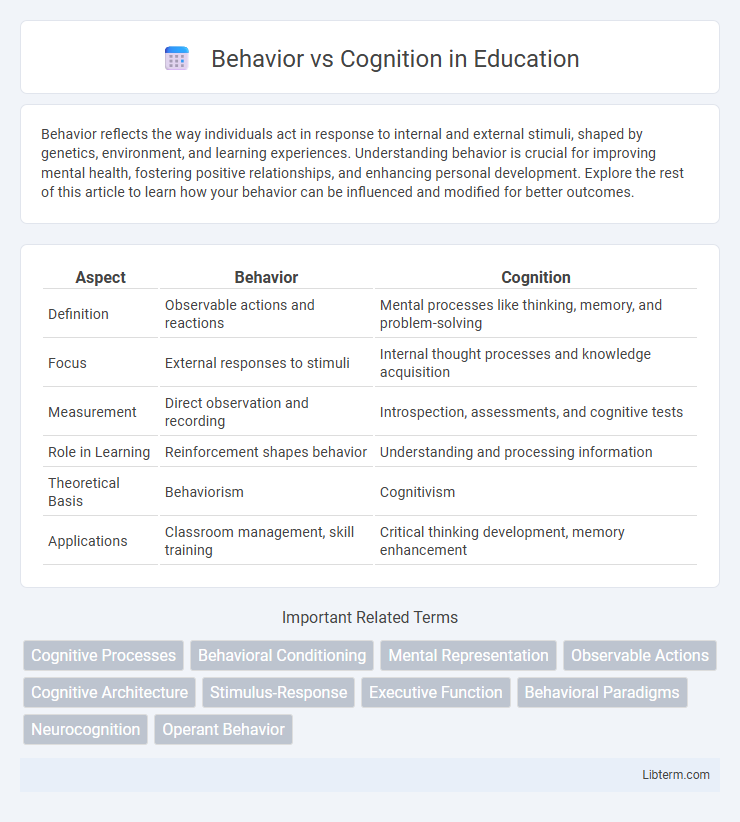Behavior reflects the way individuals act in response to internal and external stimuli, shaped by genetics, environment, and learning experiences. Understanding behavior is crucial for improving mental health, fostering positive relationships, and enhancing personal development. Explore the rest of this article to learn how your behavior can be influenced and modified for better outcomes.
Table of Comparison
| Aspect | Behavior | Cognition |
|---|---|---|
| Definition | Observable actions and reactions | Mental processes like thinking, memory, and problem-solving |
| Focus | External responses to stimuli | Internal thought processes and knowledge acquisition |
| Measurement | Direct observation and recording | Introspection, assessments, and cognitive tests |
| Role in Learning | Reinforcement shapes behavior | Understanding and processing information |
| Theoretical Basis | Behaviorism | Cognitivism |
| Applications | Classroom management, skill training | Critical thinking development, memory enhancement |
Defining Behavior and Cognition
Behavior encompasses observable actions and reactions exhibited by organisms in response to environmental stimuli, emphasizing external measurable activities. Cognition refers to internal mental processes including perception, memory, reasoning, and problem-solving, highlighting how information is acquired, processed, and stored. Both constructs are essential in psychology, with behavior focusing on external responses and cognition analyzing internal thought mechanisms.
Key Differences Between Behavior and Cognition
Behavior refers to observable actions or reactions of an organism in response to external stimuli, while cognition involves internal mental processes such as thinking, memory, and problem-solving. Behavior is measurable and externally visible, whereas cognition encompasses subjective experiences and neural mechanisms that are not directly observable. Key differences include their focus on external versus internal processes and the methodologies used to study each, with behavior analyzed through empirical observation and cognition examined via experimental psychology and neuroscience.
The Interplay of Behavior and Cognition
Behavior and cognition are deeply interconnected, with cognitive processes such as perception, memory, and decision-making directly influencing behavioral responses. Behavioral patterns provide observable evidence of underlying cognitive functions and mechanisms, enabling researchers to infer mental states and cognitive strategies. Understanding the dynamic interplay between behavior and cognition enhances insights into how individuals adapt to their environments through learning, problem-solving, and social interaction.
Behavioral Theories in Psychology
Behavioral theories in psychology emphasize the role of observable behaviors and external stimuli in understanding human actions, prioritizing learning processes like classical conditioning, operant conditioning, and modeling. These theories, pioneered by psychologists such as B.F. Skinner and John Watson, reject internal mental states as primary determinants, instead focusing on how reinforcement, punishment, and environmental factors shape behavior. Behavioral psychology remains critical in applied settings like therapy, education, and behavior modification, demonstrating measurable changes through systematic behavioral interventions.
Cognitive Theories in Psychology
Cognitive theories in psychology emphasize internal mental processes such as perception, memory, and problem-solving, contrasting with behaviorism's focus on observable behaviors. These theories explore how individuals acquire, process, and store information, influencing their actions and decision-making. Key models like Piaget's cognitive development theory and Vygotsky's social constructivism highlight the dynamic interplay between cognition and learning environments.
Real-World Examples of Behavior vs Cognition
Behavior includes observable actions such as a student raising their hand in class or an employee meeting deadlines, demonstrating tangible responses to stimuli. Cognition involves internal mental processes like problem-solving strategies used by a chess player or the memory recall involved when a witness describes a crime. Real-world examples show behavior relates to external expressions, while cognition underpins those actions through thought, perception, and decision-making.
Measuring Behavior and Cognition
Measuring behavior involves observable actions recorded through methods like direct observation, experiments, and behavioral coding, providing quantifiable data on how individuals interact with their environment. Cognition measurement employs techniques such as cognitive tests, neuroimaging, and self-report questionnaires to assess mental processes including memory, attention, and problem-solving. Combining behavioral metrics with cognitive assessments offers comprehensive insights into the relationship between actions and underlying mental functions.
Impact of Environment on Behavior and Cognition
Environmental factors significantly influence behavior and cognition by shaping neural pathways and cognitive processes through sensory experiences and social interactions. Exposure to enriched environments enhances cognitive functions such as memory, attention, and problem-solving, while stressful or deprived conditions can impair behavioral responses and cognitive development. Studies in behavioral neuroscience highlight the plasticity of the brain, demonstrating that environmental stimuli directly affect learning, emotional regulation, and adaptive behaviors.
Applications in Education and Therapy
Behavioral approaches in education emphasize observable actions and reinforcement techniques to shape student learning and classroom management, fostering skill acquisition and behavioral improvement. Cognitive strategies focus on mental processes such as memory, problem-solving, and critical thinking, enhancing comprehension and self-regulation in both academic and therapeutic settings. Integrating behaviorist and cognitive methods in therapy supports holistic treatment plans that address both external behaviors and underlying thought patterns for conditions like ADHD and anxiety disorders.
Future Directions in Behavioral and Cognitive Science
Future directions in behavioral and cognitive science emphasize integrating neurotechnology with machine learning to unravel complex brain-behavior relationships. Advances in real-time data analytics and wearable sensors enable precise monitoring of cognitive processes and behavioral patterns in naturalistic settings. Interdisciplinary research leveraging artificial intelligence models promises breakthroughs in personalized interventions for mental health and adaptive learning systems.
Behavior Infographic

 libterm.com
libterm.com